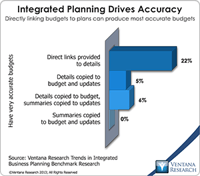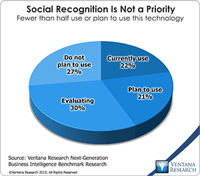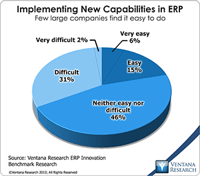Oracle continues to enrich the capabilities of its Hyperion suite of applications that support the finance function, but I wonder if that will be enough to sustain its market share and new generation of expectations. At the recent Oracle OpenWorld these new features were on display, and spokespeople described how the company will be transitioning its software to cloud deployment. Our 2013 Financial Performance Management Value (FPM) Index rates Oracle Hyperion a Warm vendor in my analysis,...
Read More
Topics:
Big Data,
Mobile,
Planning,
Social Media,
ERP,
Human Capital Management,
Modeling,
Office of Finance,
Reporting,
Budgeting,
close,
closing,
Consolidation,
Controller,
driver-based,
Finance Financial Applications Financial Close,
Hyperion,
IFRS,
Tax,
XBRL,
Analytics,
Business Analytics,
Business Intelligence,
CIO,
Cloud Computing,
In-memory,
Oracle,
Business Performance Management (BPM),
CFO,
compliance,
Data,
Financial Performance Management (FPM),
benchmark,
Financial Performance Management,
financial reporting,
FPM,
GAAP,
Integrated Business Planning,
Price Optimization,
Profitability,
SEC Software
Business planning as practiced today is a relic, a process hemmed in by obsolete conceptions of what it should be. I use the term “business planning” to encompass all of the forward-looking activities in which companies routinely engage, including, for example, sales, production and head-count planning as well as budgeting. Companies need to take a fresh view of all these, adopting a new approach to business planning that while preserving continuity makes a substantial departure from what most...
Read More
Topics:
Big Data,
Planning,
Predictive Analytics,
Social Media,
Office of Finance,
Operational Performance Management (OPM),
Reporting,
Budgeting,
Controller,
In-memory,
Business Performance Management (BPM),
CFO,
Financial Performance Management (FPM),
Supply Chain Performance Management (SCPM),
Financial Performance Management,
financial reporting,
FPM,
Integrated Business Planning
Enterprise resource planning (ERP) systems emerged in the 1990s. Even though they don’t do much in the way of planning, the systems provide companies a means of centralizing and consolidating transaction data collection (such as purchase orders, inventory movements and depreciation), automating the management of processes, and handling the bookkeeping and financial record keeping for these transactions and related processes. ERP systems are an indispensable piece of IT infrastructure in today’s...
Read More
Topics:
Mobile,
SAP,
Social Media,
ERP,
Operational Performance Management (OPM),
Analytics,
Business Collaboration,
Cloud Computing,
Oracle,
Business Performance Management (BPM),
CFO,
Infor,
Supply Chain Performance Management (SCPM),
Workday,
Social,
FPM,
Intacct
At this year’s Inforum user group conference, Infor representatives showed the progress the organization has made since last year in transforming itself from a ragbag of mostly small, often obsolete software companies to a competitive vendor of a modern enterprise management software suite. Infor was created by private equity investors employing a “rollup” strategy, aimed at combining smaller companies within an industry to form a single larger company that could achieve economies of scale and...
Read More
Topics:
Big Data,
Mobile,
Planning,
Social Media,
GRC,
Office of Finance,
Operational Performance Management (OPM),
Budgeting,
closing,
Analytics,
Business Analytics,
Business Collaboration,
Cloud Computing,
Collaboration,
Business Performance Management (BPM),
CFO,
Customer Performance Management (CPM),
Financial Performance Management (FPM),
Infor,
Information Management (IM),
IT Performance Management (ITPM),
Risk,
Sales Performance Management (SPM),
Supply Chain Performance Management (SCPM),
Workforce Performance Management (WPM),
FPM,
SEC
Ventana Research does benchmark research that assesses the maturity of organizations across four dimensions: people, process, information and technology. We examine business issues along those dimensions because we recognize the interconnected relationships among them. Especially in larger companies, data issues such as accuracy and accessibility are often a root cause of poor performance of a core function. It may be a factor in such areas as poor customer service, sales execution or...
Read More
Topics:
Big Data,
Planning,
Social Media,
Office of Finance,
Operational Performance Management (OPM),
Reporting,
Budgeting,
driver-based,
Business Performance Management (BPM),
Customer Performance Management (CPM),
Financial Performance Management (FPM),
Sales Performance Management (SPM),
Supply Chain Performance Management (SCPM),
Workforce Performance Management (WPM),
Financial Performance Management,
Integrated Business Planning
I recently started a series of blog posts on what CEOs (and for that matter, all senior corporate executives) need to know about IT. The first covered the high-level issues. As I noted there, it’s not necessary for a CEO of a company to be able to write Java code or master the intricacies of an ERP or sales compensation application. However, CEOs must grasp the basics of IT just as they must understand basic corporate finance, the production process and – at least at a high level – the...
Read More
Topics:
Big Data,
Mobile,
SaaS,
Social Media,
Customer,
ERP,
Operational Performance Management (OPM),
Business Analytics,
Business Collaboration,
Cloud Computing,
Complex Event Processing,
In-memory,
Business Performance Management (BPM),
CFO,
Customer Performance Management (CPM),
Financial Performance Management (FPM),
Information Management (IM),
Sales Performance Management (SPM),
Supply Chain Performance Management (SCPM),
Workforce Performance Management (WPM),
CEO,
PaaS
The idea of devising and using maturity assessments to improve business performance has been a staple of management, functional and strategic consultants for decades. It’s based on two unassailable principles. One is the general assertion that companies differ in their ability to do anything along a range from nonexistent to advanced. The second is that at any time it’s possible for a knowledgeable individual to construct a scale of competence for some business function from least to most...
Read More
Topics:
Performance Management,
Social Media,
Customer Experience,
Governance,
Operational Performance Management (OPM),
Business Analytics,
Business Collaboration,
Business Intelligence,
Cloud Computing,
Governance, Risk & Compliance (GRC),
Operational Intelligence,
Business Performance Management (BPM),
Customer Performance Management (CPM),
Financial Performance Management (FPM),
Information Applications (IA),
Information Management (IM),
IT Performance Management (ITPM),
Sales Performance Management (SPM),
Supply Chain Performance Management (SCPM),
Workforce Performance Management (WPM),
benchmark,
FPM
I cover the meat-and-potatoes aspects of corporate computing. I also pay attention to the special needs of midsize companies (by our definition, those with between 100 and 999 employees), which are unlike those of either small business or large corporations. After attending this year’s Dreamforce conference, Salesforce.com’s annual user meeting held this week in San Francisco, I can appreciate how difficult it is for executives and people who work in back office functions to cut through the...
Read More
Topics:
Sales,
Salesforce.com,
Social Media,
ERP,
Office of Finance,
CRM customer service,
SMB,
Cloud Computing,
Business Performance Management (BPM),
Customer Performance Management (CPM),
Dreamforce,
finance,
Financial Performance Management (FPM),
Sales Performance Management (SPM),
Security,
FPM
Anyone who focuses on the practical uses of information technology, as I do, must consider the data aspects of adopting any new technology to achieve some business purpose. Reliable data must be readily available in the necessary form and format, or that shiny new IT bauble you want to deploy will fall short of expectations. Our research benchmarks cover a range of core business and IT processes, and they regularly demonstrate that data deficiencies are a root cause of issues organizations have...
Read More
Topics:
Social Media,
GRC,
Operational Performance Management (OPM),
IBM Business Analytics,
Business Analytics,
Business Collaboration,
Business Intelligence,
CIO,
Governance, Risk & Compliance (GRC),
Operational Intelligence,
Business Performance Management (BPM),
CFO,
Customer Performance Management (CPM),
finance,
Financial Performance Management (FPM),
Information Applications (IA),
Information Management (IM),
Sales Performance Management (SPM),
Supply Chain Performance Management (SCPM),
Workforce Performance Management (WPM)
















